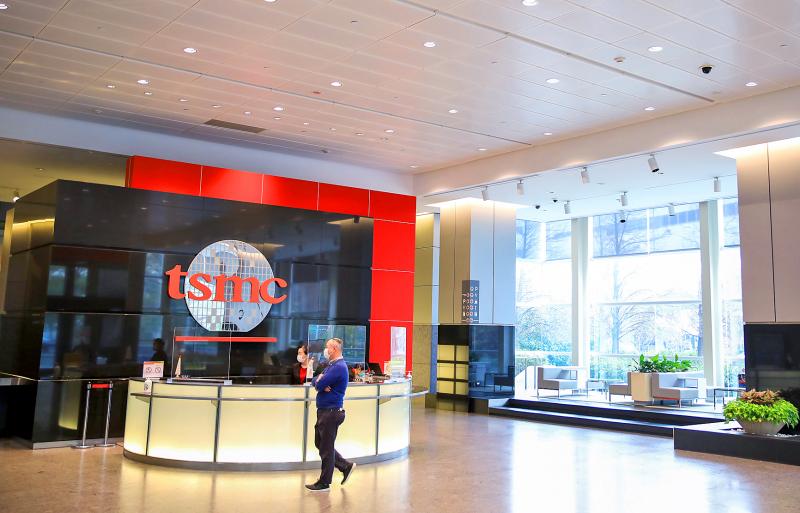Chinese authorities should seize Taiwan Semiconductor Manufacturing Co (TSMC, 台積電) if the US were to sanction Beijing in a similar way that it acted against Russia, a senior Chinese economist said in a transcript released yesterday.
“If the US and the West impose destructive sanctions on China like sanctions against Russia, we must recover Taiwan,” China Center for International Economic Exchanges Chen Wenling (陳文玲) said last month.
The research group is overseen by the National Development and Reform Commission, China’s top economic planning agency.

Photo: Cheng, I-hwa, Bloomberg
“Especially in the reconstruction of the industrial chain and supply chain, we must seize TSMC,” Chen said in a speech at an event hosted by the Chongyang Institute for Financial Studies at Renmin University, with the transcript posted online yesterday by the Guancha news Web site.
“They are speeding up the transfer to the US to build six factories there,” she said. “We must not let all the goals of the transfer be achieved.”
The comments are some of the most prominent so far showing how Taiwan’s chip industry is seen in Beijing as a key strategic asset in the intensifying rivalry between the world’s two largest economies.
TSMC is the world’s largest contract manufacturer of semiconductors, accounting for more than 50 percent of the global foundry market, which involves businesses purely making chips for other companies. Its customers include Apple Inc, which relies on Taiwanese chips for iPhones.
A TSMC representative declined to comment on Chen’s remarks.
Media reports have said that TSMC is to build six chip fabs in the US, but the company has announced just one so far. It has bought more land for possible construction.
It is unclear how the scenario Chen described would occur, given that the US and other nations only leveled harsh economic sanctions on Russia after it invaded Ukraine in February.
Chinese President Xi Jinping (習近平) has sought to achieve tech self-sufficiency and tapped his economic czar, Chinese Vice Premier Liu He (劉鶴), to shepherd a key initiative aimed at helping domestic chipmakers overcome US sanctions.
Those sanctions, which were initiated by the administration of former US president Donald Trump, are impeding longer-term efforts by chipmakers from migrating toward more advanced wafer fabrication technologies.

Taiwan Semiconductor Manufacturing Co (TSMC, 台積電) has secured three construction permits for its plan to build a state-of-the-art A14 wafer fab in Taichung, and is likely to start construction soon, the Central Taiwan Science Park Bureau said yesterday. Speaking with CNA, Wang Chun-chieh (王俊傑), deputy director general of the science park bureau, said the world’s largest contract chipmaker has received three construction permits — one to build a fab to roll out sophisticated chips, another to build a central utility plant to provide water and electricity for the facility and the other to build three office buildings. With the three permits, TSMC

RUN IT BACK: A succesful first project working with hyperscalers to design chips encouraged MediaTek to start a second project, aiming to hit stride in 2028 MediaTek Inc (聯發科), the world’s biggest smartphone chip supplier, yesterday said it is engaging a second hyperscaler to help design artificial intelligence (AI) accelerators used in data centers following a similar project expected to generate revenue streams soon. The first AI accelerator project is to bring in US$1 billion revenue next year and several billion US dollars more in 2027, MediaTek chief executive officer Rick Tsai (蔡力行) told a virtual investor conference yesterday. The second AI accelerator project is expected to contribute to revenue beginning in 2028, Tsai said. MediaTek yesterday raised its revenue forecast for the global AI accelerator used

The DBS Foundation yesterday announced the launch of two flagship programs, “Silver Motion” and “Happier Caregiver, Healthier Seniors,” in partnership with CCILU Ltd, Hondao Senior Citizens’ Welfare Foundation and the Garden of Hope Foundation to help Taiwan face the challenges of a rapidly aging population. The foundation said it would invest S$4.91 million (US$3.8 million) over three years to foster inclusion and resilience in an aging society. “Aging may bring challenges, but it also brings opportunities. With many Asian markets rapidly becoming super-aged, the DBS Foundation is working with a regional ecosystem of like-minded partners across the private, public and people sectors

BREAKTHROUGH TECH: Powertech expects its fan-out PLP system to become mainstream, saying it can offer three-times greater production throughput Chip packaging service provider Powertech Technology Inc (力成科技) plans to more than double its capital expenditures next year to more than NT$40 billion (US$1.31 billion) as demand for its new panel-level packaging (PLP) technology, primarily used in chips for artificial intelligence (AI) applications, has greatly exceeded what it can supply. A significant portion of the budget, about US$1 billion, would be earmarked for fan-out PLP technology, Powertech told investors yesterday. Its heavy investment in fan-out PLP technology over the past 10 years is expected to bear fruit in 2027 after the technology enters volume production, it said, adding that the tech would